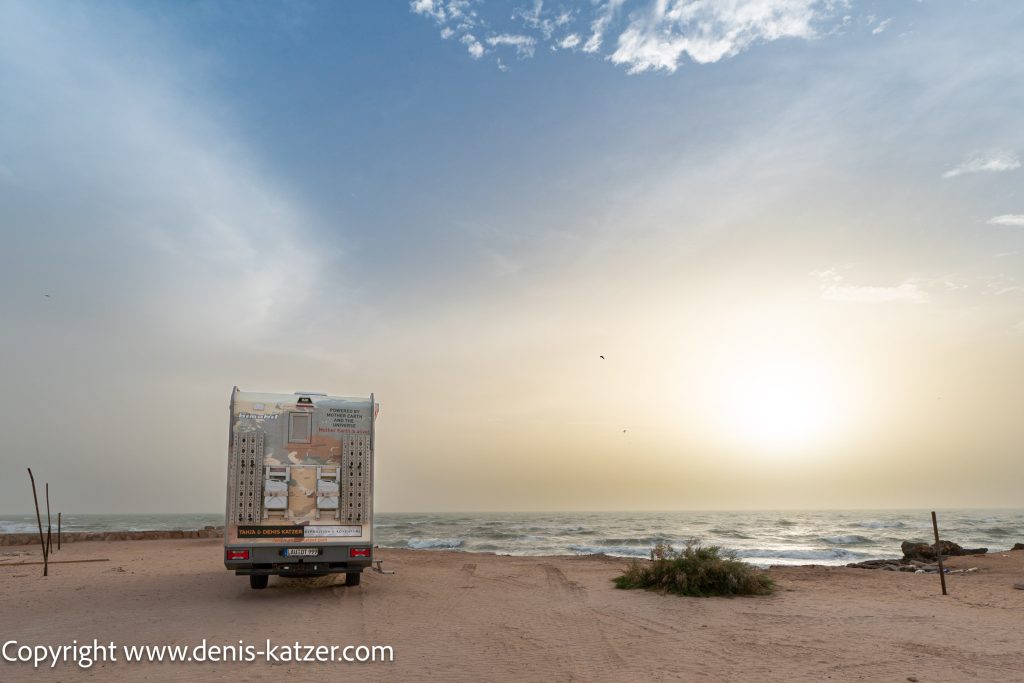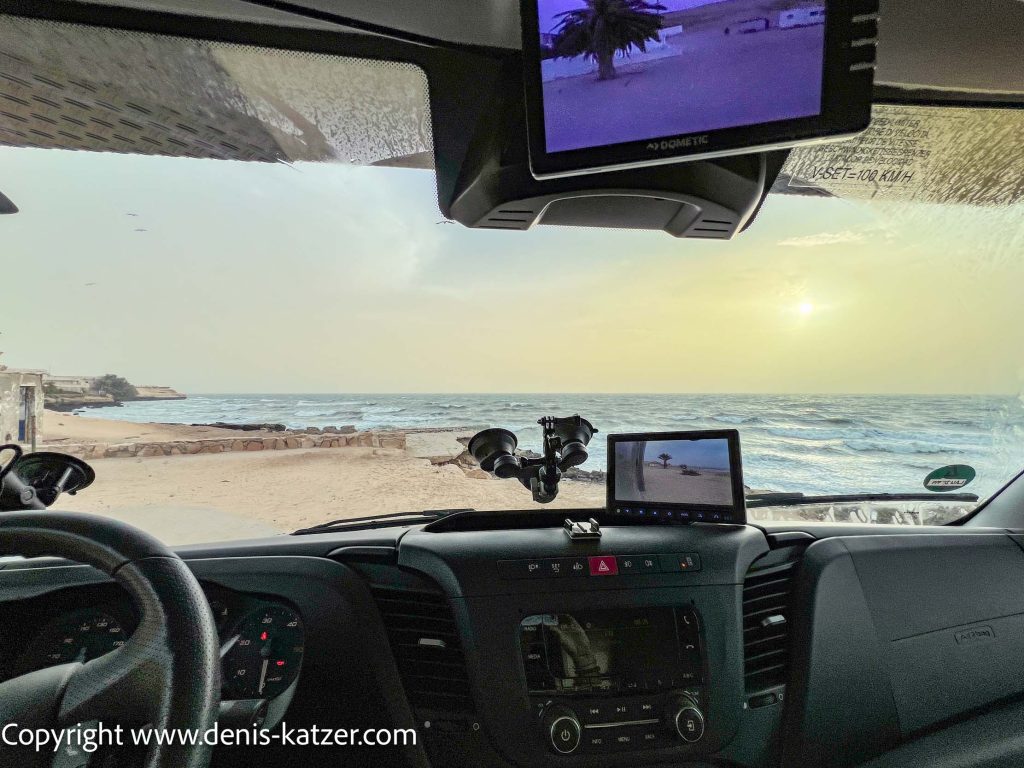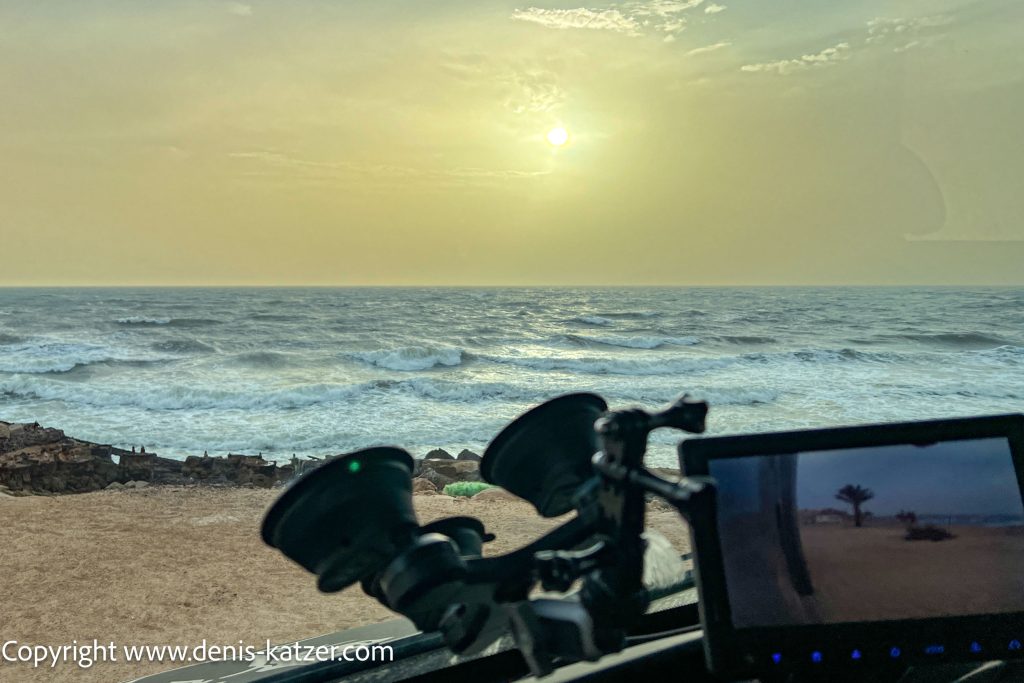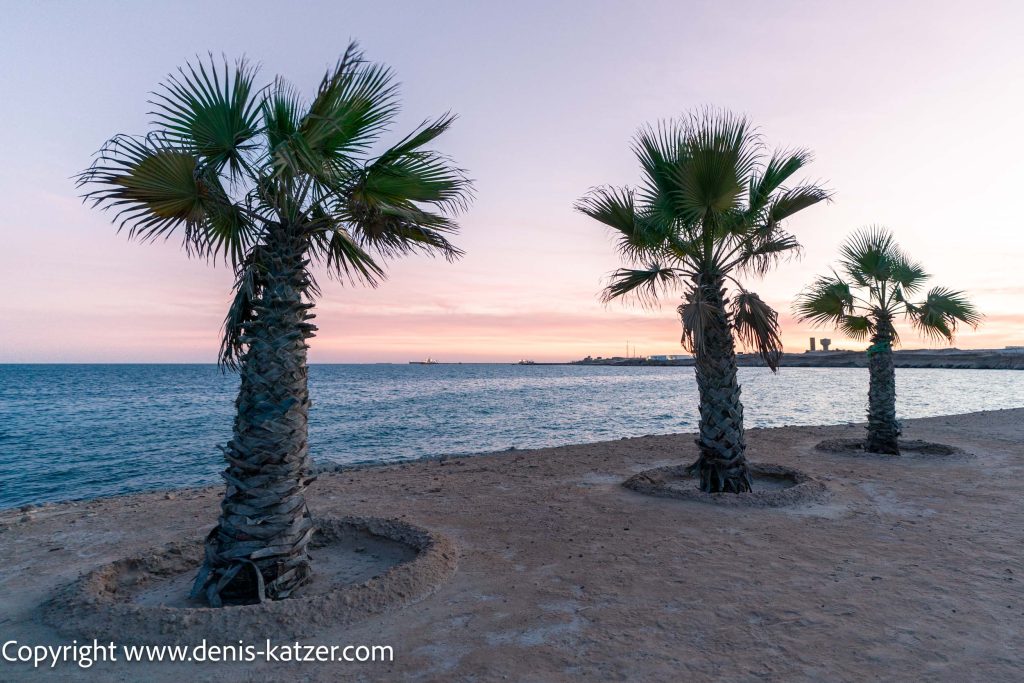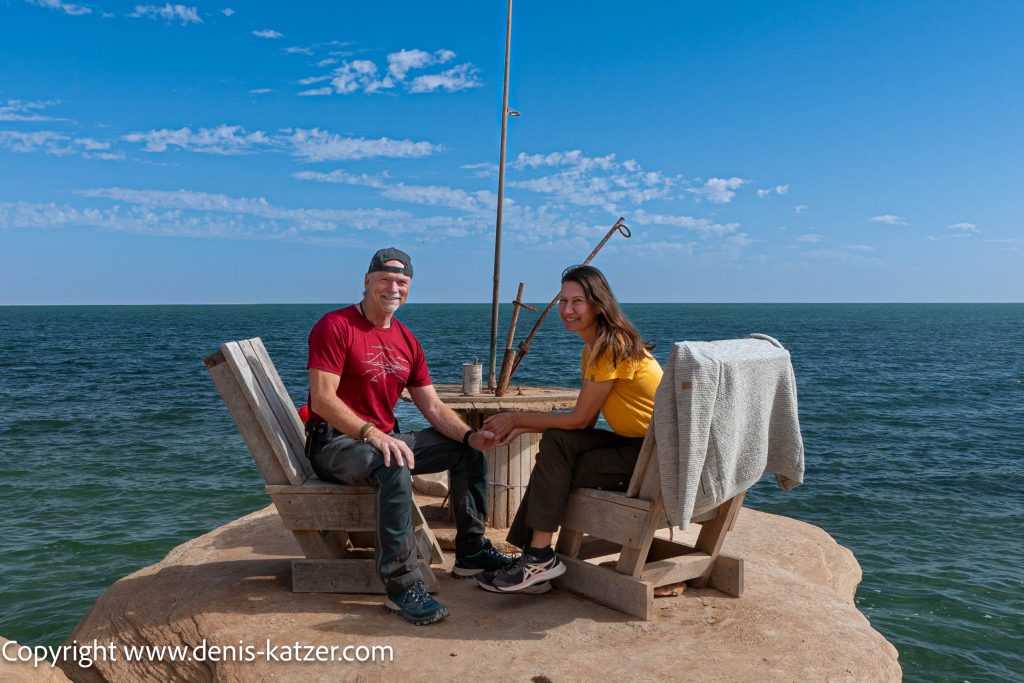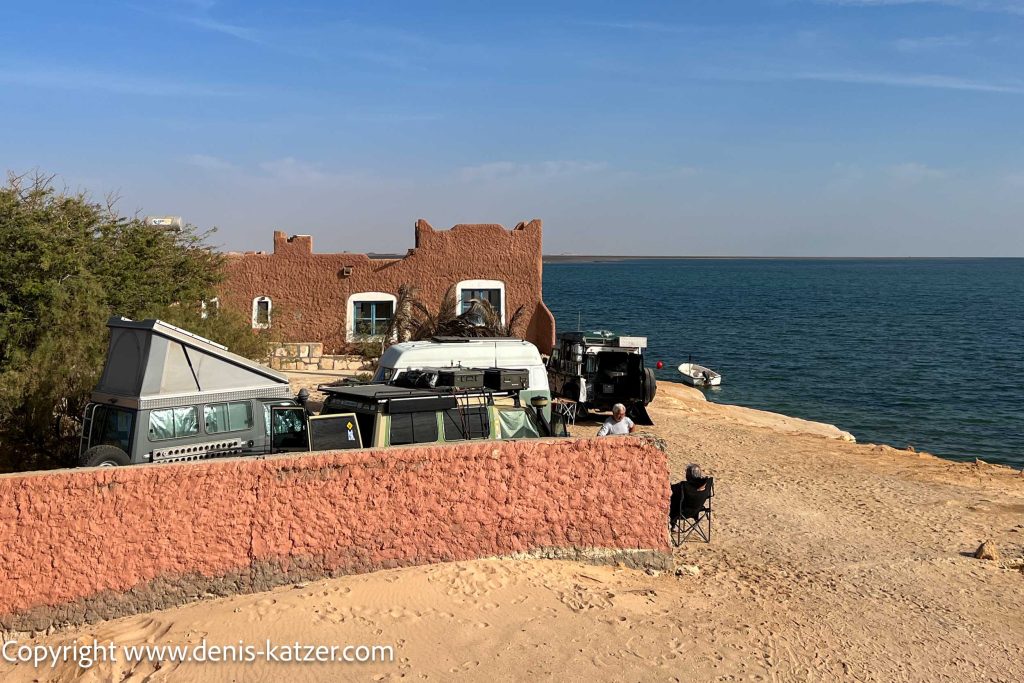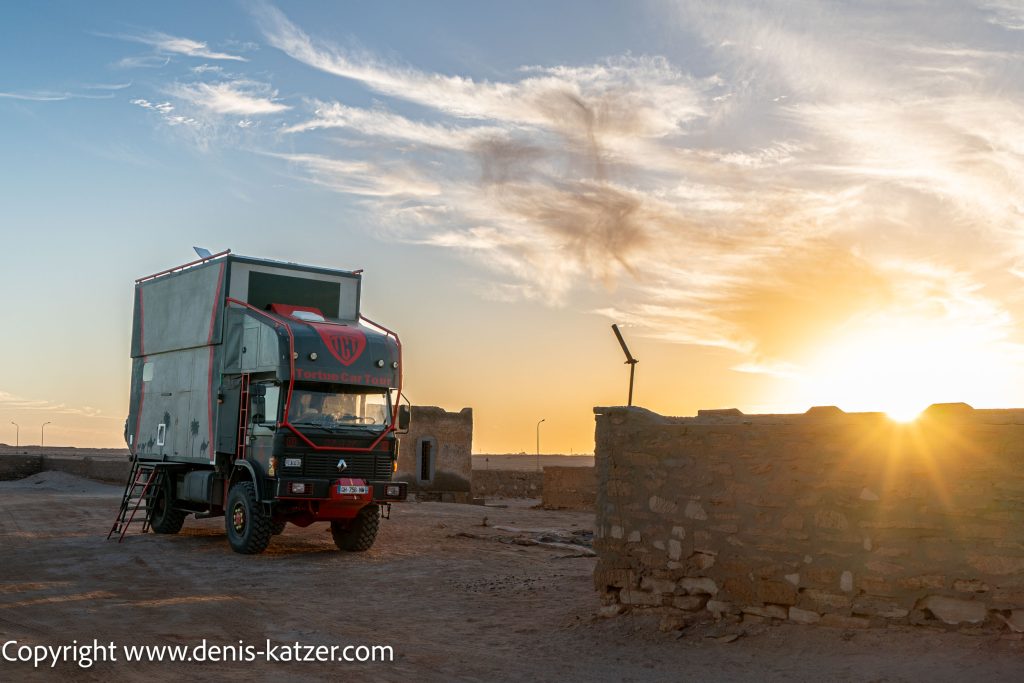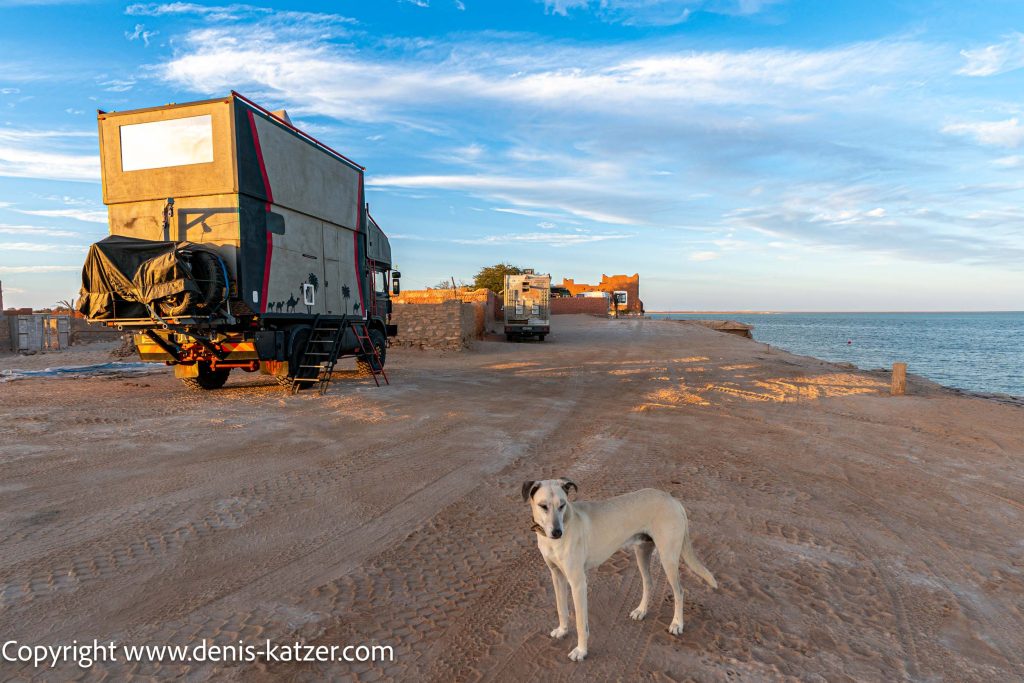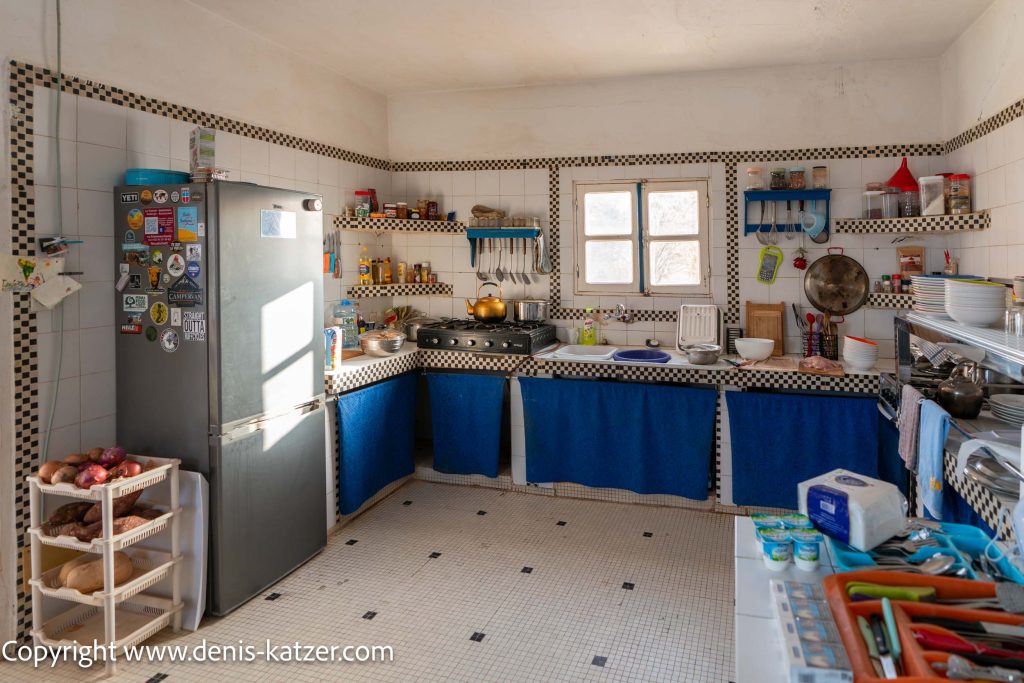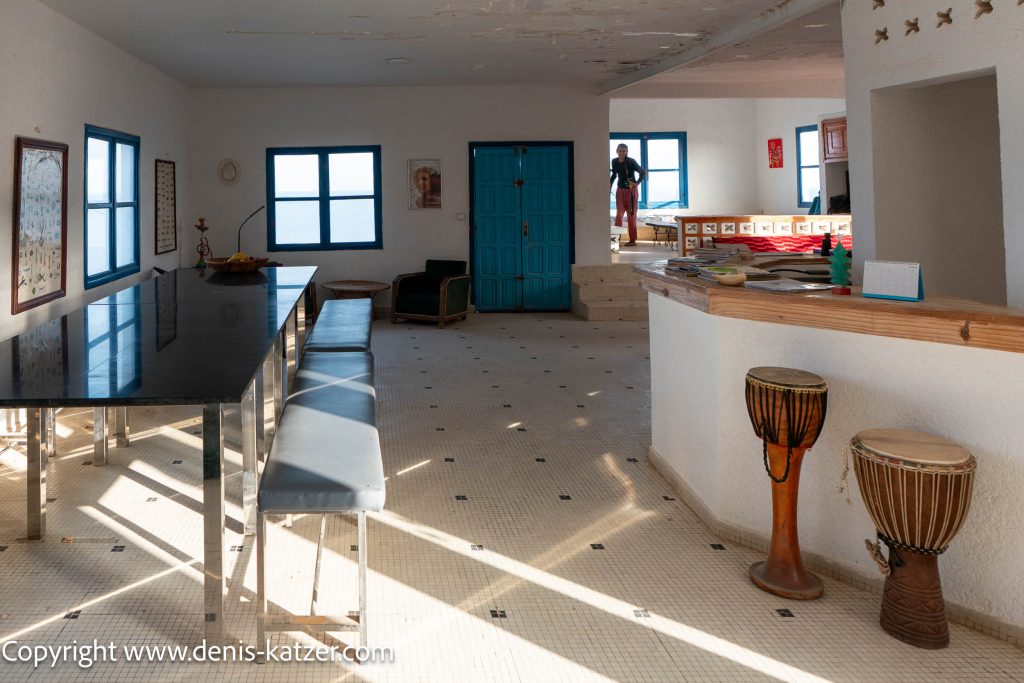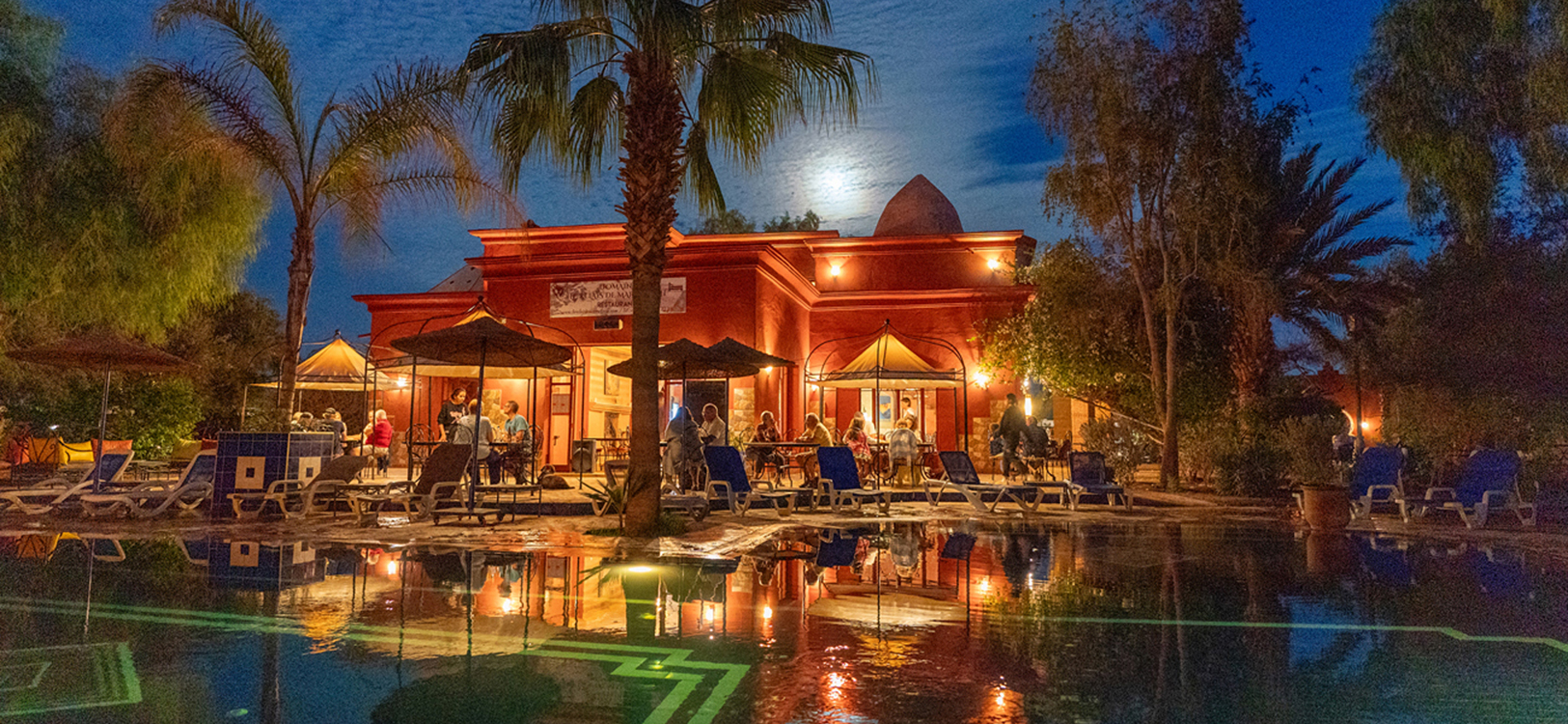
SKURRILSTER CAMPINGPLATZ – ATM eats credit card
N 20°51'05.0" W 017°01'51.7"
Day: 379 – 385
Camp: 71
Country: Mauritania
Location: Pitch on the shore of the Atlantic
Latitude N: 20°51’05.0″
Longitude W: 017°01’51.7″
Total kilometers: 10,062 km
Height: 5 meters
Temperature day max: 25°
Night temperature: 19°
After a windswept night, we get up at 8:00 am. I immediately park the Terra in a more sheltered place out of the wind. Then I go to the reception of the nearby hotel to ask for fresh bread. The buffet in the restaurant seems quite modest. The lady behind the counter speaks Arabic and French, not English, which makes communication difficult for me as I unfortunately don’t understand French. One of the guests who has just greeted me kindly helps out as a translator. “You can’t exchange money here,” he says.
Then a man in a hotel uniform appears. He speaks a few words of English. “You can already change money, but at a very unfavorable rate of 38 rupees for 1 euro,” he explains. That’s five rupees less than at the bank,” I reply. “I’m sorry, but this is our course. Is there an ATM somewhere around here?” I want to know. “Only in the city,” I hear.
I leave the hotel a little exasperated and find an ATM a few hundred meters further on. When I put my credit card into the slot, it is eaten by the machine. In a fit of panic, I press a few buttons. It buzzes and hums and lo and behold my card slowly reappears. I give up for the time being and walk back to our pitch through the bizarre and deserted-looking district. There on the deserted beach, right on the shore of the Atlantic, we enjoy the peace and seclusion. The only thing we hear here is the sound of the waves and the gentle whisper of the wind…
A week later, we leave our pitch to visit one of the few supermarkets in the town of Nouadhibou. We see desperately poor people on the roadside and ask ourselves whether it is right to give them some of the clothes we have brought with us. This consideration arises because we fear that this will create the expectation that all motorhome owners have something to give away or would like to give something away. In a few areas of Morocco, especially in the Rif Mountains, there have been reports for years of children or young people throwing stones at vehicles after receiving nothing. This is undoubtedly a direct consequence of this. So, what is the right behavior? Is there a right or wrong?
After night had fallen during our border crossing from Morocco to Mauritania and the journey soon became a little scary for us, today we see our drive through the second largest city in Mauritania, Nouadhibou, which is home to the country’s largest port and acts as an economic center, in a different light. Although it is daylight, we don’t really feel safe for the first few kilometers. It’s not that we’re afraid of being mugged, certainly not, but rather whether we can cope with the absolutely chaotic traffic.
Most of the traffic lights in the city of 120,000 inhabitants are out of order, and even when they are working, they are simply ignored by all road users. Our full attention is required. Almost every vehicle is defective or in a deplorable condition. There really is chaos.
The visible poverty hits us like a blow. Mauritania is one of the poorest countries in the world. There is a high level of economic inequality here, with much of the wealth and resources concentrated among a small elite. As a result, the poorest population groups have only limited access to resources and opportunities.
As on our arrival, we are still shocked that slavery still exists in Mauritania despite several official abolitions – most recently in 2007. This concerns the descendants of people who were enslaved generations ago and have not yet been freed. The main victims are black people who serve as slaves for the Bidhan ethnic group (also known as “white Moors”).
The exact number of slaves in the country is unknown, but is estimated by human rights groups to be in the hundreds of thousands.
Looking out of the window of our Terra Love, we wonder which of the people scurrying back and forth on the streets here are still slaves. How might these people feel? What might they think? And how incredibly rich must we appear in their eyes when we drive through the streets and alleys in such a large, modern expedition vehicle?
After restocking our food supplies, we are on our way to a well-known overland meeting place, the Villa Maguela, when we inadvertently witness terrible cruelty to animals. In Mauritania, as in many other West African countries, working donkeys suffer under extreme conditions. They are forced to carry excessively heavy loads, especially heavy water barrels, and are often mistreated until they collapse. The inadequate harnesses cut deep into their flesh, resulting in serious wounds and injuries.
To counteract this suffering, the Austrian animal welfare organization RespekTiere has set up a mobile donkey station on site. This station is run by three vets and several hoof trimmers, who work seven days a week and provide free care for maltreated donkeys at the water points. Every month, around 1,100 donkeys receive medical help in this way.
RespekTiere is also involved in educational work, including radio spots, to sensitize local people to a more respectful treatment of animals. In addition, the donkey aid project supports unemployed seamstresses from the slums of the capital Nouakchott by offering them work making donkey halters. These halters are distributed free of charge to the donkey owners so that the changes in direction are no longer made by beating, but by the halters. This reduces injuries to the animals’ necks.
The Austrian animal welfare organization RespekTiere has been successfully campaigning for donkeys in Mauritania since 2006.
We arrive at the guest house, which offers Oberländer fantastic pitches right on the Atlantic coast and has some lovely rooms with freshly made-up beds for all other travelers. At the right time of year, you can see dolphins jumping and birds fishing. The owner of this extraordinary location is Dutchman Victor, who greets us warmly at the entrance to his property.
Over the last few weeks, travelers from Senegal or on their way from Morocco to South Africa have repeatedly told us that they should definitely visit this relaxed place. Villa Maguela is located near the town of Nouadhibou, about 60 km from the Mauritanian-Moroccan border, and is a wonderful place for exchanges. Here, overlanders from all over the world share exciting and often fascinating stories about Africa.
On some days, especially when enough guests are staying here or there is a public holiday, Victor and his helper, the Englishwoman called Tish, offer a veritable feast. It looks like we’re very lucky today, and my mouth is watering just thinking about it.
Most guests leave Villa Maguela the next day. We had a wonderful time together, so it’s not easy to say goodbye. Most of them return to Morocco, some continue their journey towards Senegal, and only a few venture on the exciting journey to South Africa to the Cape of Good Hope. A journey that leads from Mauritania through 19 countries and across 19 borders, depending on the route chosen and the political situation. After our trip turned out to be completely different to what we had originally planned, we start to think about whether we should embark on the big adventure and possibly also drive through all these African countries to South Africa. It’s a thought that suddenly comes into our heads.
Here is the link to the video:
